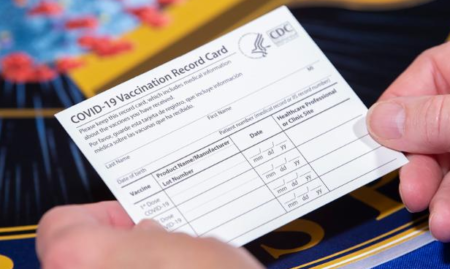Insomniac fruit flies, collectable Covid cards, mouse blindness cure, and more
04 Dec 2020
Posted by Andrew Kantor
Unsung heroes
Take a moment to think about the healthcare workers who are ‘down inside,’ running the millions of Covid-19 tests being sent every day. “Across the nation, testing teams are grappling with burnout, repetitive-stress injuries and an overwhelming sense of doom.”
Pharmacists could connect poor kids with their vaccines
Sure, because of the pandemic HHS is allowing pharmacists to deliver more vaccines. But it would like to take that idea further — to get pharmacists into the federal Vaccines for Children program, which provides vaccines for needy kids.
Why aren’t pharmacists on board? The big reason is red tape and cost:
Enrollees must adhere to strict storage and handling requirements that involve expensive thermometers and refrigerators used only for products delivered under the government program. And if there isn’t enough demand, said vaccine experts, the investment may not be worth it.
And even though Georgia is one state where Medicaid will reimburse pharmacies for the vaccinations, that payment may still fall short of the actual cost.
In a few decades, these will be collector’s items
The feds are planning to give everyone a Covid-19 vaccination card to help them record when they’ve received their first shot — and remind them to get the second.
Vaccination clinics will also be reporting to their state immunization registries what vaccine was given, so that, for example, an entity could run a query if it didn’t know where a patient got a first dose.
Side note: Former presidents Obama, Bush and Clinton have volunteered to get the coronavirus vaccine publicly to prove it’s safe.

With Fauci’s signature, these would be worth a mint
Miracle drug
An experimental drug called ISRIB has reversed the mental aging process in forgetful, mentally challenged mice. In fact, it also appears to “reverse cognitive impairments in Down Syndrome, prevent noise-related hearing loss, fight certain types of prostate cancer, and even enhance cognition in healthy animals.”
No, this isn’t something being pushed by Gwyneth Paltrow or Dr. Oz. This is the real deal … well, it certainly comes from a legit biochemist at UC San Francisco.
Just one day after giving the mice a single dose of ISRIB…
They found that common signatures of neuronal aging disappeared literally overnight: neurons’ electrical activity became more sprightly and responsive to stimulation, and cells showed more robust connectivity with cells around them while also showing an ability to form stable connections with one another usually only seen in younger mice.
Exactly how ISRIB works is still under investigation — it seems to reset the body’s normal integrated stress response, which can get “stuck in the on position” and impede the function of brain and immune cells.
Three, er, two blind mice
Harvard scientists may have finally cracked the age-old problem of blind mice. They were able to “[turn] back the clock on aged eye cells in the retina to recapture youthful gene function.”
The trick: Sending three genes into the retinas — genes that normally only express during the mice’s embryonic stage. In a sense, they literally made the old retinas new again. To be clear, this isn’t stopping vision loss from glaucoma, it’s reversing it.
A shield of brass and oak
If you’ve ever had to battle any kind of magical creature, you know that cold iron and silver are good choices for weapons.
The real world might not be that much different. We know that brass kills germs*, and now it seems that oak surfaces might inhibit the growth of bacteria as well. Researchers at France’s Higher School of Wood (“Ecole Supérieur du Bois”) have found that — contrary to what you would expect — oak surfaces, unlike aluminum, polycarbonate, or stainless steel.
The potential reasons: Oak deprives bacteria of moisture, or oak’s natural bacterial defenses. (And yes, that could be why wooden cutting boards are less likely to foster bacteria than plastic ones.)
* Fun fact: Older New York City elementary schools have brass doorknobs for this very reason.
Rock-a-bye fruit fly…
If you have an insomniac fruit fly on your hands, try rocking it to sleep with a vibrating lullaby. Researchers at Thomas Jefferson University found that “Fruit flies that are lulled by gentle vibrations while they fall asleep snooze for longer, a finding that could explain why babies like to be rocked or why people nod off in the car.”

Artist’s conception
Seven words from Captain Obvious
“Vaccines Without Vaccinations Won’t End the Pandemic”
The long read: Georgia Schools edition
From Georgia Health News and ProPublica: How different policies in different school systems — Emanuel and Marietta — led to different, but not terribly surprising, outcomes. “School mask policies: A study in contrasts.”


